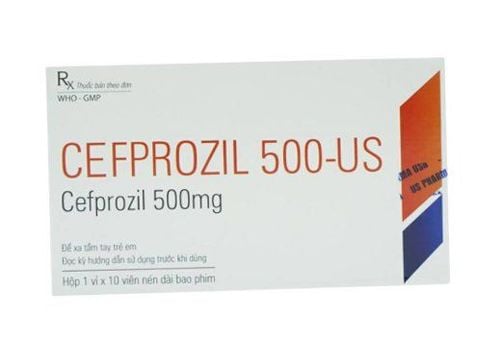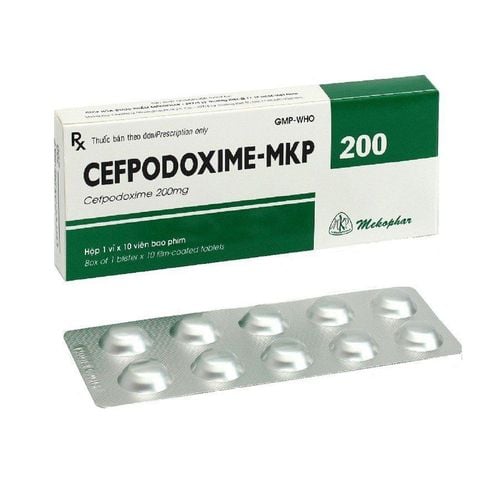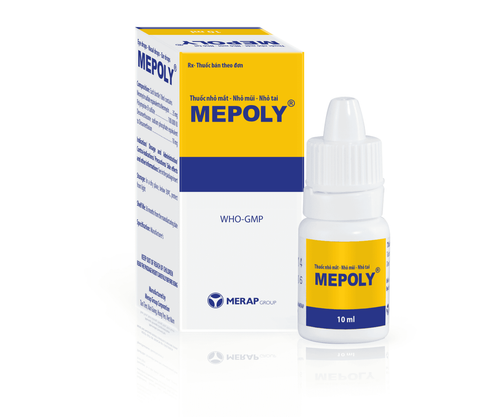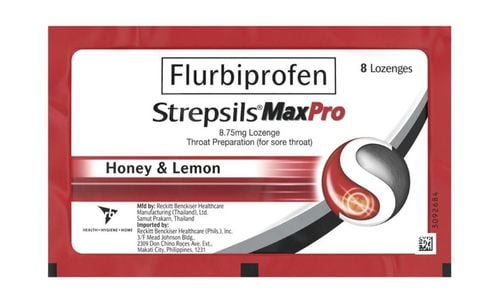This is an automatically translated article.
Cefaclor 250mg medicine is often used in the treatment of a number of diseases such as otitis media, pharyngitis, tonsillitis, sinusitis, pneumonia,... So what does Cefaclor 250mg do and how to use this drug? how?
1. What are the effects of Cefaclor 250mg?
Cefaclor 250mg drug is made in the form of capsules, the main ingredient in each tablet is Cefaclor (as cefaclor monohydrate) 250mg. Cefaclor is a semi-synthetic, second-generation cephalosporin antibiotic that kills growing and dividing bacteria by inhibiting bacterial cell wall synthesis.
Cefaclor is active against Gram-positive cocci similar to cephalothin, but is more active against Gram-negative bacteria, especially Haemophilus influenzae and Moraxella catarrhalis, is active even against H. influenzae and M. catarrhalis produce beta - lactamase.
Cefaclor 250mg is indicated in the following cases:
Acute otitis media, pharyngitis, acute sinusitis, recurrent tonsillitis. Chronic bronchitis in acute exacerbation, pneumonia. Uncomplicated lower urinary tract infections. Skin and soft tissue infections caused by susceptible Staphylococcus aureus and Streptococcus pyogenes. Infections caused by susceptible bacteria. Cefaclor 250mg is contraindicated in the following cases:
People with a history of allergy to cephalosporin antibiotics. Some notes when using Cefaclor 250mg:
Caution when using Cefaclor 250mg for patients allergic to penicillin because of cross-sensitivity. Cefaclor 250mg should be used with caution in patients with a history of gastrointestinal disease, especially colitis because long-term use of cefaclor can cause pseudomembranous colitis. Renal function should be monitored when cefaclor 250mg is used in patients with impaired renal function.
2. Dosage and how to use Cefaclor 250mg
Cefaclor 250mg drug is prepared in the form of capsules, used orally, taken on an empty stomach.
Dosage of Cefaclor 250mg should follow the doctor's instructions, the recommended dose is as follows:
Adults and the elderly: Use 1 tablet / time, 8 hours / time. Children: Use dose 20-40mg/kg body weight/24 hours, divided into 2-3 oral doses. Renal impairment: Creatinine clearance 10 - 50ml/min: Use 50% of the usual dose. Creatinine clearance < 10 ml/min: Use 25% of the usual dose. Patients requiring hemodialysis: Initial dose is 1 - 4 tablets before dialysis, maintenance dose is 1 - 2 tablets every 6-8 hours between dialysis sessions. When using an overdose of Cefaclor 250mg, you may have symptoms such as nausea, vomiting, epigastric pain, diarrhea.
How to handle an overdose of Cefaclor 250mg as follows:
Protect the patient's respiratory tract, support ventilation and infusion. Reduce oral absorption by giving the patient multiple oral doses of activated charcoal. Can perform gastric lavage and add activated charcoal or just use activated charcoal. No need to wash the stomach, intestines, unless you have taken cefaclor 5 times the normal dose.
3. Side effects of the drug Cefaclor 250mg
Common side effects of Cefaclor 250mg include:
Eosinophilia Diarrhea Measles rash. Uncommon side effects of Cefaclor 250mg include:
Positive direct Coombs test Lymphocytes, leukopenia, neutropenia. Nausea, vomiting. Pruritus, urticaria Genital itching, vaginitis, candidiasis. Rare side effects of Cefaclor 250mg include:
Anaphylactic reactions, fever, serum sickness-like symptoms. Stevens-Johnson syndrome Lyell syndrome Generalized pustular skin rash Thrombocytopenia, hemolytic anemia. Pseudomembranous colitis Elevated liver enzymes, hepatitis and cholestatic jaundice. Reversible interstitial nephritis, mildly elevated blood urea or serum creatinine, or abnormal urinalysis. Seizures, hyperactivity, confusion, hallucinations, headache, restlessness, insomnia, hypertonia, dizziness, somnolence, arthralgia. Inform your doctor about the side effects you experience while using Cefaclor 250mg.
4. Interaction of Cefaclor 250mg with other drugs
Concomitant administration of cefaclor and warfarin rarely causes an increase in prothrombin time, causing clinical bleeding. Probenecid increases the serum concentration of cefaclor. Concomitant administration of Cefaclor with aminoglycoside antibiotics or furosemide diuretics will increase nephrotoxicity. Although the above is almost all the complete information about the drug Cefaclor 250mg. However, to ensure safety, bring high efficiency, patients should consult their doctor, pharmacist before using.
Please dial HOTLINE for more information or register for an appointment HERE. Download MyVinmec app to make appointments faster and to manage your bookings easily.













